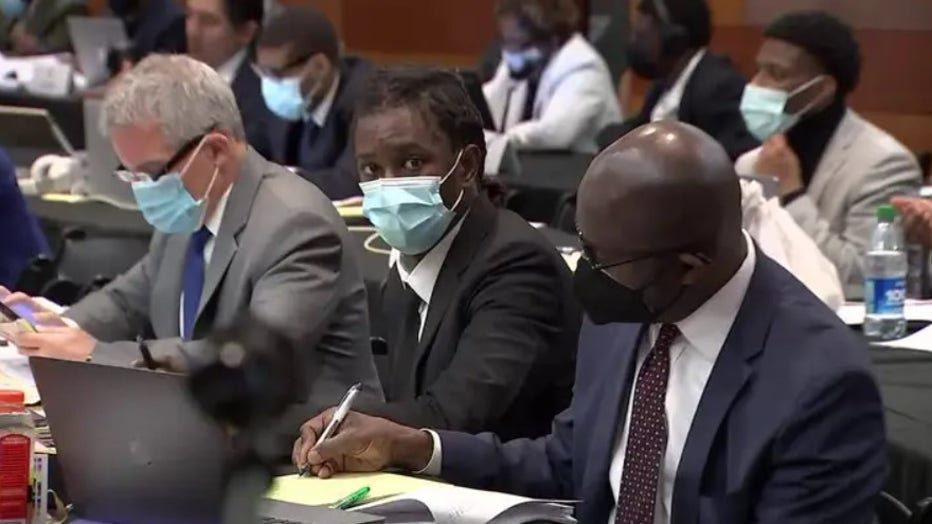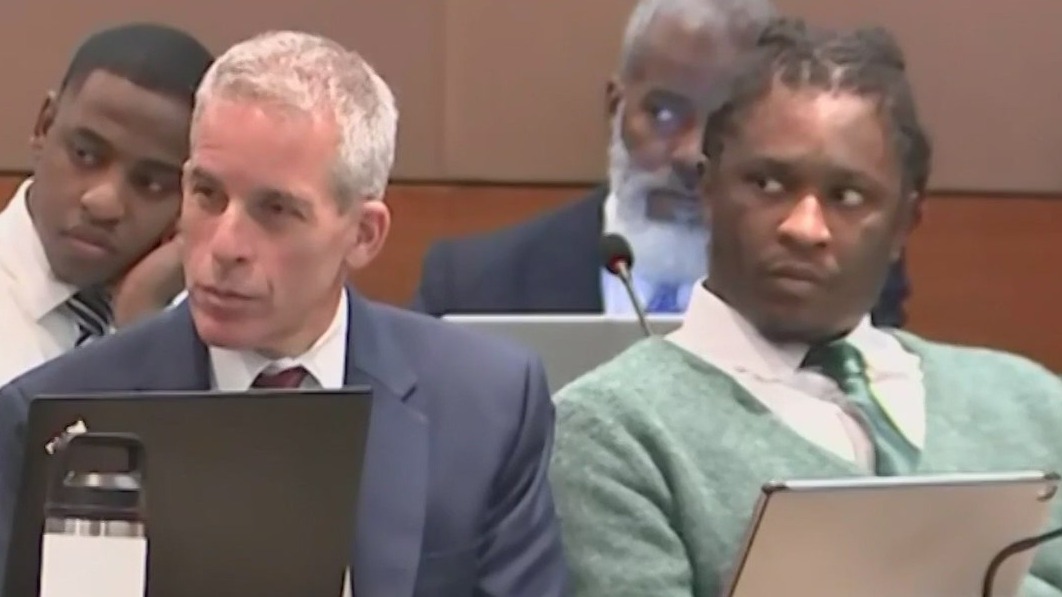Young Thug YSL trial updates: Judge rules lyrics can be used in RICO case

YSL RICO case: Some Young Thug lyrics can be used as evidence
In just two and a half weeks, the Fulton County jury on the Young Slime Life gang and racketeering trial will begin hearing the case. Thursday, the judge made his ruling on some of the evidence which could include the defendants’ own rap lyrics.
FULTON COUNTY, Ga. - A Fulton County judge has made a major ruling about evidence in the case against Young Thug and several other defendants charged with violating Georgia's RICO Act and accused of participating in a criminal street gang responsible for violent crimes.
On Thursday morning, Fulton County Superior Court Judge Ural Glanville ruled that the Atlanta rapper's lyrics could be used during Young Thug's racketeering trial.
"I'm going to conditionally admit particularized lyrics," said Fulton County Chief Superior Court Judge Ural Glanville.
Several of the lyrics are too explicit for TV or online, but here are some that can be included, "I shot at his mommy, now he no longer mentions me." Another one reads, "Hey, how you doing? I’m Yak Gotti, I got bodies on bodies..."
"These are party admissions that happen to come in the form of lyrics," said Fulton County Assistant District Attorney Mike Carlson as he argued why they should be included Wednesday.

Judge rules on usage of rap lyrics
A Georgia judge has ruled that rap lyrics can be used as evidence in the RICO trial of Young Thug and other members of the YSL group.
The defense teams had argued against their use, saying it is protected speech, and it would prejudice the jury.
"If you let this in nobody should ever say anything to anyone else," said Brian Steel, who represents Young Thug.
While Judge Glanville will allow the lyrics, he made it clear prosecutors cannot just throw words out, they have to tie them to the case.
"Anything that the court may rule upon at this point in time will be subject to a complete foundation being met," he said.
Prosecutors argued the lyrics will help prove the rapper, whose given name is Jeffery Lamar Williams, and five others were part of a criminal street gang known as YSL that is allegedly affiliated with the national Bloods gang.
"The lyrics are being used to prove the nature of YSL as a racketeering enterprise, the expectations of YSL as a criminal street gang," said Fulton County Assistant District Attorney Mike Carlson in court Wednesday. "We’ve got party admissions for even the offense of murder here; this is evidentiary use."

Lawyers debate whether rap lyrics should be evidence
A Fulton County judge is hearing arguments about whether rap lyrics can be used as evidence in the Young Slime Life RICO case centered around rapper Young Thug. Wednesday's hearing comes just weeks before the six defendants go to trial later in November.
JURY SEATED AFTER NEARLY A YEAR IN YOUNG THUG YSL TRIAL
As part of their argument, Fulton County District Attorney Fani Wilis and her office argued that the rap lyrics in the tracks released by the artists on the label are evidence of crimes committed by the gang, saying that the lyrics are "highly pertinent" to the defendants' state of mind and intents.
"'I just beat a murder rap,’" said Fulton County Deputy District Attorney Simone Hylton as she read the lyrics in court. "‘I paid my lawyer, 30 for that.' There’s a few other lyrics in between that and then ‘me and my slimes are above the law.’"

Can lyrics be used as evidence in YSL trial
Defense attorneys in the YSL RICO trial plan to have several experts testify that rap lyrics are negatively interpreted by most Americans because of racial bias.
Defense attorneys maintain that YSL was nothing more than a recording label known as Young Stoner Life Records - a label that has featured several big acts including Young Thug and Gunna.
The defense also argued in front of Judge Glanville that allowing the lyrics in the trial would prejudice the jury.
"There's a giant elephant in the room which is that we’re ignoring art," said Doug Weinstein, the attorney for Deamonte Kendrick. "There is art here and the art has got to be separated from real life."
Weinstein says it is one thing that his client must defend himself against the charges, but he says it is unfair they’re trying to use his own lyrics against him as fact.
"What Mr. Kendrick is singing about is what he grew up around," Weinstein said. "What else is he supposed to sing about? He’s not going to sing ‘Daydream Believer.’ He’s not going to write about puppies and rainbows and unicorns."

Atlanta-based rapper Young Thug, born Jeffery Lamar Williams, appears in a Fulton County courthouse. (WAGA-TV Fox 5 Atlanta)
Prosecutors have called the defense's argument against using lyrics "ridiculous," and went as far as making references to the "Unabomber" Ted Kaczynski and Timothy McVeigh.
Glanville agreed with the prosecution, saying that he examined the First Amendment issues in connection with the case and found that some of the lyrics could be admitted into evidence with conditions.
In his ruling, Glanville, allowed 17 sets of lyrics provided by the state to be conditionally used during the trial.
Documents reveal prosecutors have spent nine years scouring the music and social media posts of the Young Slime Life members. But they also say they have additional evidence against Young Thug and his co-defendants.
Prosecutors also have no doubt scoured through the lyrics of Young Thug’s latest album "Business is Business," which was released back in June despite the rapper being held in the Fulton County Jail.
Glanville's ruling remains preliminary and could be subject to other objections from defense lawyers.
Any additional lyrics prosecutors want to use in the trial would have to go through the same process, the judge said.

Jury seated in Young Thug YSL trial
The YSL RICO trial has dragged on for 10 months at the Fulton County Courthouse. Getting a jury seated has been the main hold up, but that changed Wednesday. What could be Georgia's longest court case ever is centered around Atlanta rapper Young Thug.
Where does the YSL RICO case stand?
Young Thug, whose legal name is Jeffery Lamar Williams, has pleaded not guilty to charges of conspiracy to violate Georgia's RICO Act and participation in a criminal street gang.
Last December, rapper Gunna, whose legal name is Sergio Kitchens, walked out of the Fulton County Jail after taking a plea deal. Attorneys for Gunna said Kitchens, in exchange for a guilty plea, will not serve any time in prison. The plea deal sentenced him to five years with one year to serve in prison. That time was commuted to time served, and the balance was suspended. He will need to complete 500 hours of community service, with 350 of those hours speaking to young men and women in the community about the dangers of gangs and gang violence.
The YSL RICO trial has dragged on for 10 months at the Fulton County Courthouse. Getting a jury seated has been the main hold-up, but that changed last Wednesday when a jury was finally seated.
The original indictment charged 28 people with conspiracy to violate Georgia’s Racketeer Influenced and Corrupt Organizations, or RICO, law and also included other charges against many of them. Fourteen of them are set to proceed to trial. Eight, including Gunna, have taken plea deals. Six will be tried later.

Young Thug's YSL RICO trial just got more complicated
The Young Thug trial keeps getting more and more complicated. The rapper’s lawyers now complain prosecutors’ witness list has doubled. And the defense says it’s still waiting on crucial evidence in the case. All this and not one juror has been seated.
In addition to specific charges, the 2022 indictment includes a wide-ranging list of 191 acts that prosecutors say were committed between 2013 and 2022 as part of the alleged RICO conspiracy to further the gang’s interests.
Included in that list is an allegation that Young Thug threatened in July 2015 to shoot a security guard who was trying to get him to leave an Atlanta-area mall. On numerous occasions, he and others are alleged to have possessed various illegal drugs that they intended to distribute.
The indictment also accuses alleged gang associates of trying to kill rapper YFN Lucci in the Fulton County Jail last February and says that an alleged gang associate shot at a bus in 2015 that was carrying rapper Lil Wayne.

Who is expected to testify at rapper Young Thug's RICO trial?
Fulton County prosecutors say Young Thug, whose real name is Jeffery Williams, is one of the founder of Young Slime Life, a violent Atlanta street gang. The rapper says he's an artist who's been falsely accused. A look at the high-profile witness list
Lawmakers try to protect rappers' First Amendment rights after YSL indictments
The debate over the use of rap lyrics has been discussed at all levels of government following the indictment.
Rep. Hank Johnson, D-Georgia, introduced a new proposal called the "Restoring Artistic Protections Act," or "RAP Act," in 2022. It was a proposal that would limit the use of lyrics as permissible evidence in federal court. Johnson said artists often play roles in their music that are not meant to be taken literally.
The congressman, who represents Decatur, Conyers, Lithonia, Lilburn, and part of Atlanta, co-sponsored the bill with Rep. Jamaal Bowman, D-New York. He said it would protect an artist’s creative expression and First Amendment rights.
Rep. Hank Johnson, D-Georgia's 4th Congressional District (FOX 5)
The bill would require federal prosecutors to prove the lyrics refer to the specific facts of an alleged federal crime or show the artist literally intended to carry out what they said in those lyrics.
"You should not be able to just simply put in some lyrics and say this is the state of mind of the person who is accused," Johnson said.
The lawmakers introduced the bill as Fulton County prosecutors accused Atlanta rappers Young Thug and Gunna of running a street gang tied to murders and shootings. Prosecutors said their lyrics are evidence of crimes.
"The case here in Fulton County demonstrates a need for guardrails to protect the creative expression of artists," Johnson said.
The bill would not cover cases at the state or county level. Time is running out for the measure in the congressional session.
A similar effort was being explored in Georgia. Neither state nor federal proposals have yet passed.
The Associated Press contributed to this report.

